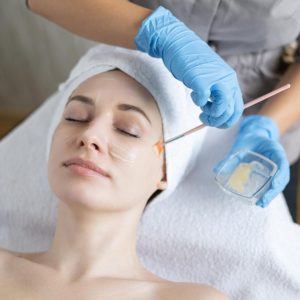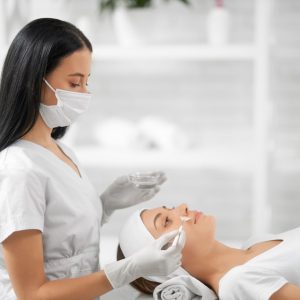Chemical peel treatments are skin treatments that use chemical ingredients to help clear your skin. These treatments are not only effective at exfoliating your skin but also offer several other advantages. Here are five things you should know about chemical peels
Advantages Of Using Chemical Peels
 Chemical peel treatments offer a plethora of benefits. Here are a few significant advantages you must know.
Chemical peel treatments offer a plethora of benefits. Here are a few significant advantages you must know.
– Chemical peels can effectively treat stubborn acne breakouts, particularly if you have large or inflamed patches of acne. You should always talk to your doctor before undergoing a chemical peel treatment, as some people have allergic reactions to certain chemicals used in chemical peels.
– The most apparent benefit of chemical peels is that they can transform your skin by exfoliating, sloughing off dead skin cells, and delivering antioxidants to the surface. They are also effective at reducing the number of blackheads and clearing blocked pores.
– They also target underlying problems such as acne, rosacea, hyperpigmentation, and acne scars. They can also treat sun damage, age spots, and uneven texture
– These treatments are also known to stimulate collagen production, making them an excellent option for treating signs of aging like fine lines and wrinkles.
– Chemical peels are quick and easy to apply. They also have a relatively low risk of side effects. One important note: not all chemical peels are created equal. For example, oil-based chemical peels are more effective than water-based options. It is, therefore, essential to do your research before making any purchases.
All in all, chemical peels are a great way to brighten your complexion while helping to restore smoothness and clarity to your skin.
What Are The Different Types Of Chemical Peels? Which One Is The Best?
It’s important to note that there are two main types of chemical peels: superficial (or light) and deep. Superficial peels generally work by loosening and exfoliating dead cells from the skin’s surface, while deeper peels work by breaking up larger clumps of collagen underneath the skin’s surface.
The most common types of chemical peels include the following:
 – Glycolic Acid Peels
– Glycolic Acid Peels
These consist of glycolic acid dissolved in water or some other carrier solution and applied to the skin in a layer that is either 10% or 20% glycolic acid. The purpose is to lighten pigmentation, exfoliate hyperpigmentation, treat acne, and smooth fine lines and wrinkles.
– AHA peels
AHA peels are great for brightening the skin and reducing the appearance of fine lines and wrinkles.
– BHA peels
BHA peels are perfect for those suffering from acne, as they can help reduce inflammation and unclog pores.
– TCA peels
TCA peels are perfect for those who want to improve the overall appearance of their skin, as they can help reduce sun damage, fine lines, and wrinkles.
– Phenol Peels
Phenol peels are the strongest of all the peels and are perfect for those who want to achieve dramatic results. If you’re considering a peel, be sure to consult with a dermatologist or esthetician to find out which type of peel is right for you.
How Are Chemical Peels Treatment Different From Conventional Chemical Peels?
Unlike traditional chemical peels, which require a layer of the peeler’s skin to be removed (and then replaced), these treatments use an agent that is applied topically and absorbed through the skin’s surface. This allows for deeper penetration into the skin layers and can lead to more effective results.
Closing
A chemical peel treatment is a sensitive procedure and may cause significant harm to your skin if done inefficiently. It is, therefore, highly advisable to consult an experienced and certified professional for the best results. For more information, visit the official site of Karmina Beauty Clinic. Book an appointment now.







